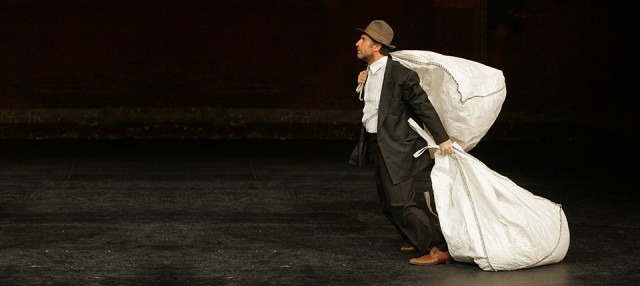
Marcello Magni deals with a disappointing existence in ACT WITHOUT WORDS II, one of five short Beckett plays that make up FRAGMENTS at BAC
Baryshnikov Arts Center, Jerome Robbins Theater
450 West 37th St. between Ninth & Tenth Aves.
Tuesday – Sunday through May 5, $75
866-811-4111
www.bacnyc.org
www.bouffesdunord.com
If you missed C.I.C.T. / Théâtre des Bouffes du Nord’s widely praised production of Fragments at the Baryshnikov Arts Center back in fall 2011, you have another chance, as the show has returned for a splendid encore run through May 5. The Theatre for a New Audience presentation is directed by theater masters Peter Brook and Marie Hélène Estienne, whose entertaining version of The Suit ran at BAM this past winter. Fragments consists of five extremely short minimalist plays by Samuel Beckett, each one an existential gem in its own right. Totaling a mere fifty minutes, they flow into one another effortlessly as they examine loneliness and despair with a wicked sense of humor. In Rough for Theatre I (1979), original Complicité members Marcello Magni and Jos Houben play a pair of destitute souls, the former a blind and rather bad violinist, the latter a one-legged man who pushes himself about on a box and believes that maybe, if they team up, they can make more money, but their prospects don’t look good. In Rockaby (1981), Kathryn Hunter, who was so outstanding in Hideki Noda’s experimental The Bee at Japan Society last year, is dazzling as a woman citing initially repetitive nonsensical text that soon begins to take shape as she contemplates the death of her mother and her own impending demise, the words coming together in a virtuosic display of poetic grandeur.
In Act without Words II (1956), Houben and Magni play two men who live in large white sacks and are individually awakened by a goad that comes down from above; in turn, each man puts on the same suit, socks, hat, and shoes, but while Houben does it with a kick in his step, Magni is disappointed in the world, releasing a series of hysterical sighs as nothing goes his way. Hunter, in fine, deep, gravelly voice, returns for the solo Neither, originally an operatic collaboration between Beckett and Morton Feldman that begins, “to and fro in shadow from inner to outer shadow / from impenetrable self to impenetrable unself by way of neither.” Come and Go (1965) concludes the evening, with Houben, Hunter, and Magni wearing fabulous dresses as they gather on a park bench; one by one, they walk away for a moment, giving the other two the opportunity to gossip about her until all three have been the target of playful maliciousness. Fragments is a delightful collection of absurdist pieces that combine to form a wonderful whole. “When [Beckett] discovered theater,” Brook writes in a program note, “it became a possibility to strive for unity, a unity in which sound, movement, rhythm, breath, and silence all come together in a single rightness.” Such a unity of rightness can be found in this stellar production.